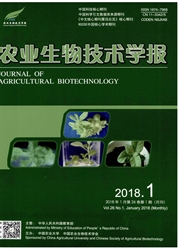

 中文摘要:
中文摘要:
肌肉生长抑制素(MSTN)能够限制肌纤维的增粗增大,而突变的肌肉生长抑制素前肽(Pro-MSTN-D75A)能阻止MSTN与相应受体的结合,从而解除MSTN对肌纤维的抑制作用。猪是我国最重要的肉用家畜,通过操作MSTN提高其瘦肉产量,将对我国生猪生产具有特殊意义。本研究用通城猪妊娠3个月的胚胎为材料,提取背最长肌RNA并以此为模板,用反转录PCR扩增猪MSTN前肽cDNA序列(不含信号肽),并将其连接到原核表达载体pGEX-6p-1上。通过定点突变将编码天冬氨酸的密码子变为丙氨酸密码子(D75A),构建了原核表达载体pGEX-ProM(SP-)和pGEX-ProM(SP-)D75A。重组质粒转化大肠杆菌(Escherichia coli)BL21感受态细胞并经IPTG诱导表达,结果表明,转化pGEX-ProM(SP-)质粒的E.coliBL21工程菌用终浓度为0.6mmol/L的IPTG诱导5h表达情况最好;而转化pGEX-ProM(SP-)D75A的工程菌在1mmol/L的IPTG诱导6h的条件下表达情况最好。用GST-Trap蛋白纯化系统纯化回收总分子量大小约为51kD融合蛋白(GST蛋白标签分子量为26kD,MSTN前肽蛋白分子量为25kD)。纯化蛋白的浓度ProM(-SP)为1.87mg/mL,ProM(-SP)D75A为1.21mg/mL。本研究建立了大肠杆菌表达猪MSTN前肽的最佳条件,提高了生产效率,并为研究MSTN前肽在动物体内的生物学功能以及制备单克隆抗体提供基础资料。
 英文摘要:
英文摘要:
Abstract Myostatin (MSTN) can inhibit the growth of skeletal muscle, while the mutated myostatin propeptide (Pro-MSTN-D75A) can inhibit myostatin activity. Pig is a very economically important livestock in China. It will play an important role in live pig production of China to increase the volume of lean meat of pig by injection of mutated myostatin propeptide. In this study, we have developed a system and optimal conditions to express myostatin propeptide. Total RNA was extracted from longissimus of 3-month embryo of Tongcheng pig and the MSTN propeptide cDNA (exclusive the signal peptide) was amplified by RT-PCR. Simultaneously,a site-directed MSTN cDNA mutant (the 75th aspartic acid changed to alanine, D75A) was also generated. Prokaryotic expression vectors of pGEX-ProM (SP-) and pGEX-ProM (SP-)-D75A were subsequently constructed and transformed into Escherichia coli cells (BL21) to express GST-fusion proteins of the wild type and mutant. The optimal expression was observed after 5h induction with 0.6 mmol/L IPTG for the wild-type MSTN gene but after 6 h induction with lmmol/L IPTG for the D75A mutant. The fusion proteins were purified by GST-Trap system with expected molecular size (-51 kD consist of 26 kD GST tag and 25 kD myostatin propeptide). Concentrations of the purified wid-type (ProM(SP-)) and mutatant (ProM (SP-)-D75A) were 1.87 mg/mL and 1.21 mg/mL, respectively. This work has provided us a basis to prepare anti-MSTN antibody and to further investigate the functions of porcine MSTN propeptide.
 同期刊论文项目
同期刊论文项目
 同项目期刊论文
同项目期刊论文
 期刊信息
期刊信息
